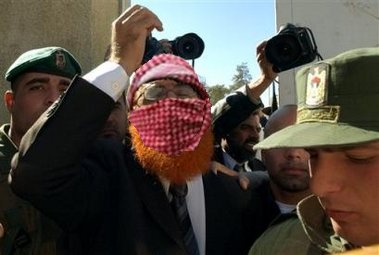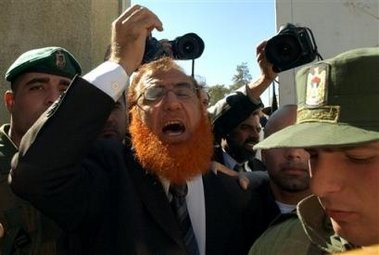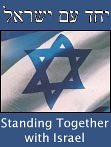Monday, March 20, 2006
What does it take to get called "moderate" around here?
As yet another moderate joins the Hamas cabinet, ironically, that august immoderate body is becoming nothing but moderates, with just a few aging emeritus extremists hanging around until their Hamas pension plan kicks in. Since I'm so eagerly awaiting the resurgence -- or at least the surgence -- of Palestinian moderates, this is truly exciting news. So let's have a closer look at what it takes to be a Palestinian moderate -- "relative", "pragmatic", or one of the other more obscure branches, it doesn't really matter.
The Hamas figure most commonly called "moderate" is Sheikh Hassan Yousef:
But all that doesn't really even matter since the Sheikh's noble openness to talks is also dependent on Israel's a priori agreement that negotiations are limited to details of the exact method and timing of her demise. Hey, that "most moderate Hamas leader" gig is good work, if you can get it.
Great. So moderate means refusing to rule out talks. Let's just verify this assumption before we write it in stone.
How about Prime Minister Ismail Haniyeh? Well, to start, he is at least a pragmatist:
So I did a little survey, trying to find the factor that is common to all Palestinians labeled as moderates. The best definition I could come up with is that a moderate is someone who is not wearing a mask. Take for instance Sheikh Abu Tir:

 While there is the outside possibility that Mr. Abu Tir might have left his mask at home as a fashion statement rather than out of commitment to moderation, nevertheless, which one would you rather have in the government you are supposed to try to make peace with? If the question is too hard, pretend the mask is scarier, and the beard less so.
While there is the outside possibility that Mr. Abu Tir might have left his mask at home as a fashion statement rather than out of commitment to moderation, nevertheless, which one would you rather have in the government you are supposed to try to make peace with? If the question is too hard, pretend the mask is scarier, and the beard less so.
Of course I don't want anyone taking this analysis too far. For instance, none of these definitions of "moderate" apply to Israelis, so don't bother making a big deal to CNN or the New York Times that Binyamin Netanyahu appears all the time without a mask, and not only hasn't ruled out talks but has already actually handed over territory to the other side through negotiations. Mr. Netanyahu is a hardliner.
An Israeli moderate would be someone who is dead. Or nearly so.
If you really, really liked this -- or even really, really hated it -- there's lots more:
The Hamas figure most commonly called "moderate" is Sheikh Hassan Yousef:
So the job of "most moderate of the Hamas leaders" goes to anyone who refuses to rule out actions their employer has already forbidden. But is simply refusing to rule something out really such a big deal? I can honestly tell my kids I refuse to explicitly rule out talks with the Tooth Fairy -- it doesn't mean I plan to negotiate each tooth's pillow price with her.
The top Hamas figure in the West Bank, he was released from Israeli prison in 2004. Yousef is the most moderate of the Hamas leaders, refusing to rule out talks with Israel under strict conditions. He was elected to the new parliament.
But all that doesn't really even matter since the Sheikh's noble openness to talks is also dependent on Israel's a priori agreement that negotiations are limited to details of the exact method and timing of her demise. Hey, that "most moderate Hamas leader" gig is good work, if you can get it.
Great. So moderate means refusing to rule out talks. Let's just verify this assumption before we write it in stone.
How about Prime Minister Ismail Haniyeh? Well, to start, he is at least a pragmatist:
Ok, please stop laughing, this is serious. What, would you prefer that Palestinian pragmatists slaughter their internal rivals instead? Maybe some of you shouldn't answer that one, but that's why they're called pragmatists instead of violent anarchists. A pragmatist, fine, but does Haniyeh qualify with the media as a moderate? You bet he does:
(NPR Morning Edition) Hamas presented a former university administrator on Monday as its choice to be the next Palestinian prime minister. Ismail Haniyeh has a reputation as a pragmatist who prefers compromise over conflict when dealing with Palestinian rivals.
So as a moderate, he must be open to talks, according to our definition.
The top candidate on the Hamas list and known as a relative moderate in the group, he was elected to the new parliament. Haniyeh is one of the most public of the Hamas figures, remaining available to comment on events even when most of the other leaders drop out of sight for fear of Israeli attacks.
So aside from Haniyeh's commitment not to murder his Palestinian political rivals as a method of domestic policy, what is his qualification as a moderate? He intends to never recognize Israel, so even if he were somehow coerced into negotiations, they would be meaningless as he isn't offering much besides choice of cigarette or blindfold -- unless you perverse sense of humor is interested in an offer of Alaskan or Balkan real estate.
“Indeed, from the hour the (Oslo) accords were endorsed, they became a part of reality to which we remain committed,” Abbas told lawmakers, adding: “The presidency and the government will continue to respect our commitment to the negotiations as a strategic, pragmatic political choice.”
Haniyeh did not agree. Abbas “was elected according to his program, and we were elected according to a different program,” he said...
So I did a little survey, trying to find the factor that is common to all Palestinians labeled as moderates. The best definition I could come up with is that a moderate is someone who is not wearing a mask. Take for instance Sheikh Abu Tir:
And if you don't believe leaving the mask on the nightstand can have such a big effect, just look at the moderating difference for yourself:
Arsenault interviewed Hamas's No. 2 candidate, Sheikh Abu Tir. Described by Bradley Burston in Ha'aretz as the "poster boy" for the moderate face of Hamas, Abu Tir contradicted this image, telling Arsenault: "Palestine is occupied since 1948. This is our right to fight," meaning that the armed struggle must continue until all of Palestine is liberated.

 While there is the outside possibility that Mr. Abu Tir might have left his mask at home as a fashion statement rather than out of commitment to moderation, nevertheless, which one would you rather have in the government you are supposed to try to make peace with? If the question is too hard, pretend the mask is scarier, and the beard less so.
While there is the outside possibility that Mr. Abu Tir might have left his mask at home as a fashion statement rather than out of commitment to moderation, nevertheless, which one would you rather have in the government you are supposed to try to make peace with? If the question is too hard, pretend the mask is scarier, and the beard less so.Of course I don't want anyone taking this analysis too far. For instance, none of these definitions of "moderate" apply to Israelis, so don't bother making a big deal to CNN or the New York Times that Binyamin Netanyahu appears all the time without a mask, and not only hasn't ruled out talks but has already actually handed over territory to the other side through negotiations. Mr. Netanyahu is a hardliner.
An Israeli moderate would be someone who is dead. Or nearly so.







